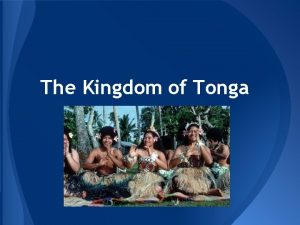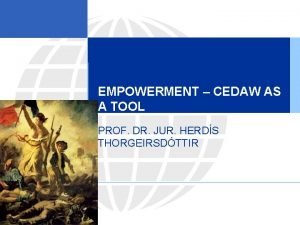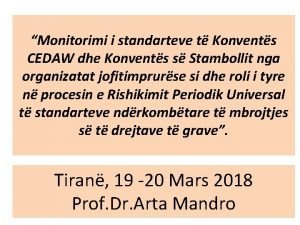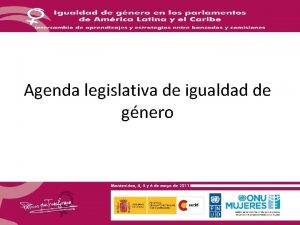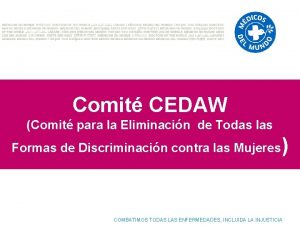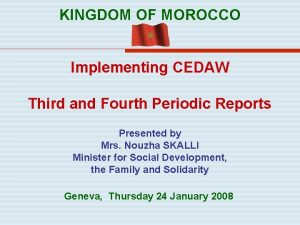CEDAW in Tonga Do the recommendations of the











- Slides: 11

CEDAW in Tonga Do the recommendations of the Tongan Royal Land Commission meet the requirements of the Convention on Elimination of Discrimination Against Women (CEDAW)? Are there other options?

Acknowledgments • The Canterbury Law Review Trust for their funding and support. Without this I would have been unable to attend this conference. • The Organisers and Support Team of the Conference. • Natalie Baird- lecturer at the University of Canterbury.

Tonga Today • Section 43 Land Act: every male Tongan subject by birth of 16 years of age not being in possession of a tax or town allotment shall be entitled to the grant of a tax or town allotment or if in possession of neither to the grant of a tax or town allotment. • Inheritance rights pass through male heirs. • Women have no independent land rights unless: • They acquire a lease; or • They are a widow of a male allotment (although they cannot deal with it, and cannot pass it on to family).

CEDAW ‘Bill of Rights’ for Women • Article 3: “ensure the full development and advancement of women” • Article 2(f): Take measures to modify or abolish discriminatory laws, regulations, customs and practices and to modify the social and cultural patterns of conduct of men and women. • Acceded to by 187 member states • Tonga has not ratified CEDAW

The Royal Land Commission Recommendations • Recommendation: Tongan women have the right to apply for a grant of a town allotment at 21. Women should not have the right to apply to tax allotment. • Recommendation: Where there is no male heir, the landowner’s daughters shall succeed the land. • Recommendation: Widows continue to hold their deceased husband’s land for life even if they commits fornication or adultery. • Recommendation: Widows be able to lease or mortgage the land, with consent of heir.

The Three Options • Option One: Implement the Commission’s recommendations and ratify CEDAW with reservations. • Option Two: Choose not to ratify CEDAW in the near future. • Option Three: Ratify CEDAW without reservations.

Option One Implement the Commission recommendations and ratify with reservations • Reservations likely to cover succession, abortion, land ownership and same sex marriages. • Articles 15 and 16 in particular. • Problem- Reservation as to Article 16 indicates a reluctance to recognise women’s full competence as adults within the family • Problem- A wide scope of reservations suggests ratification was all about Tonga’s status in the International Community. • Benefit- Engages Tonga in conversation with the CEDAW committee and other states about the reservations.

Option Two Choose not to ratify CEDAW • Ratification is dangerous because it may result in the erosion of customs and traditions important to Tongan culture. For example fahu. • Ratification of CEDAW may allow for gay marriages and abortion. • Ratification may undermine individual’s duties and responsibilities. • Problem: Sends a message that women’s rights are not promoted in Tonga. • Traditions and customs that promote women, do not apply to all Tongan women.

Option Three Ratify CEDAW without reservations • This option is desirable because of the importance of land. • Access to loans. • If my brother was to die, the land would go to my Uncle’s eldest son… it is hard work to move. My whole life is here, I have been taking care of the place for almost all my life” • As I understand the law, it will never happen that my children will be able to live on my parents land, it makes me angry… I have worked so hard for that land, and yet my children are not entitled to it”. • Gender equality is “smart economics”.

Option Three How other countries have approached the reform of discriminatory land laws • The Land Laws in both Kyrgyzstan and Tajikstan were amended and brought in line with Article 16 of CEDAW which relates to Rural women’s rights. • Between 2002 and 2008 the proportion of women owning family farms in Tajikstan rose from 2% to 14%. • The Tanzanian HC relied on CEDAW in overruling a customary law that prohibited women from selling clan land (Ephrohim v Pastory). • Problem- the amount of land available.

Conclusion • What ever option Tonga chooses, it is clear that women’s rights to land are an important issue that the Government is trying to deal with. • It is a balancing act: promoting women’s rights to land whilst protecting Tongan Culture.













